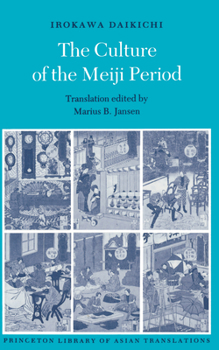The Culture of the Meiji Period
Select Format
Select Condition 
Book Overview
The description for this book, The Culture of the Meiji Period, will be forthcoming.
Format:Paperback
Language:English
ISBN:0691000301
ISBN13:9780691000305
Release Date:October 1988
Publisher:Princeton University Press
Length:344 Pages
Weight:0.90 lbs.
Dimensions:0.9" x 5.5" x 8.5"
Customer Reviews
1 rating
History of the Masses
Published by Thriftbooks.com User , 18 years ago
The Meiji Period was one of intense social, political and cultural change in Japan. Most histories deal with it through the eyes of the intellectuals and prominent writers, which tends to miss out the common people, such as farmers, local village leaders and so on. Irokawa attempts to redress the imbalance somewhat and look at the activities and thought at the local level of Japanese society, through primary sources that have been found from some interesting finds. He builds up a picture in connection with other scholars' work, as well as making some of his own conclusions based on the data he has. Irokawa also quotes extensively from the sources he uses, which adds more detail to the thoughts and ideas that were being bounced around. Although the book is dated, (and feels it, as well), it presents a very interesting and informative overview of the outlook and culture that the majority of Japanese people were exposed to during the changes that happened in the late 19th century. It details the way they sought to find their own sense of identity and how the government responded to various elements. At times, Irokawa seems to take an antagonistic stance with respect to what he calls "the emperor system" and the Meiji government, criticising the latter for its unjust treatment of farmers and locals, and its support of the creditors, (among other things). Although translated, the book is easily read and flows well. The translation was well done, making it a pleasure to read. I thoroughly enjoyed this book in all respects, and have come away with a much broader picture of what was going on in Japan during the aftermath of the Meiji Restoration.







